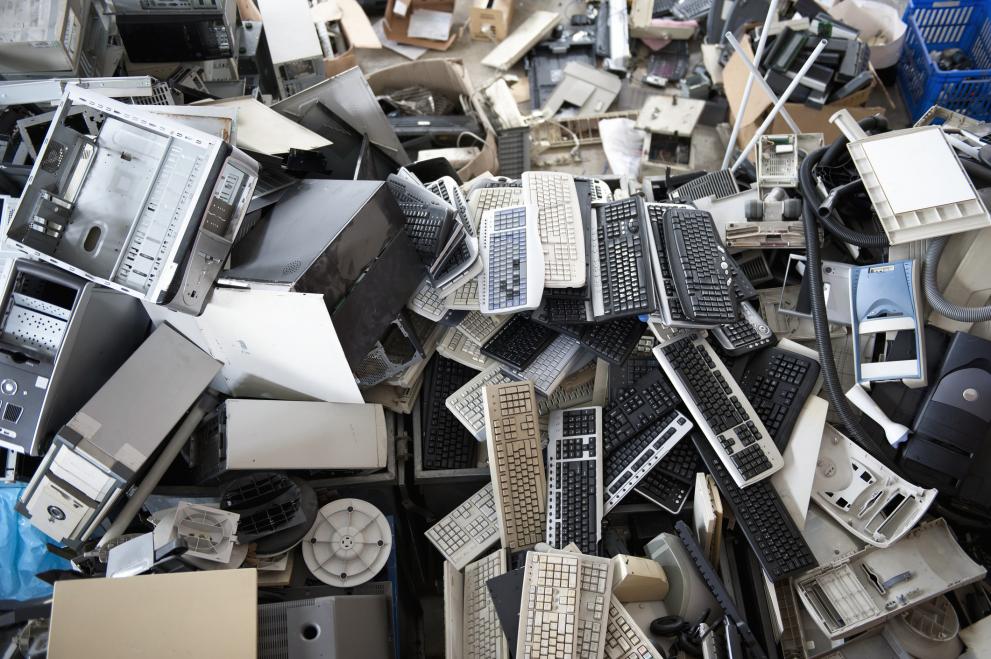
The European Commission has launched an online public consultation on the evaluation of the Directive on waste from electrical and electronic equipment (WEEE Directive) that will run until 22 September 2023.
The legislation on waste from electrical and electronic equipment (WEEE) was first adopted in 2002 to prevent or reduce the adverse impacts of WEEE on the environment and human health in the EU. The Commission has since evaluated and revised the Directive in 2012.
WEEE is one of the fastest-growing waste streams in the EU and globally. If not properly treated, it is hazardous and can have serious effects on human health and the environment. Moreover, WEEE contains precious and critical raw materials, the recovery of which is crucial to support a more circular economy and to strengthen the EU’s strategic autonomy. In the coming years, growing consumption and digitalisation will pose additional challenges. An evaluation is therefore needed to assess whether the WEEE Directive remains fit for purpose.
The Directive sets increasingly stringent collection and recovery/recycling targets. The separate collection of WEEE from unsorted municipal waste is necessary to ensure its proper treatment, but remains a major challenge in most Member States. As part of the evaluation of the Directive, the Commission carried out a compliance promotion initiative to assess both good practices and shortcomings in its implementation, including on the separate collection and on treatment practices for WEEE The Directive will also be evaluated in line with the objectives set out by the European Green Deal and the Circular Economy Action Plan, and will take into account any other relevant developments in EU environmental and waste policy (e.g., on renewable energy policies, Batteries, Eco-design for Sustainable Products, Restriction of Hazardous Substances in electrical and electronic equipment, End-of-life Vehicles, Waste Shipments, Critical Raw Materials). In particular, the Commission is seeking feedback on the identification of equipment containing critical raw materials and on existing recycling practices for these materials. The evaluation will also take into consideration international developments, such as the Basel Convention on the control of transboundary movements of hazardous wastes and their disposal.
The ongoing evaluation aims to:
- assess how effectively the Directive has been applied and its impact to date,
- assess how it contributes to the general policy objectives of the European Green Deal and the circular economy action plan,
- identify shortcomings with its implementation and enforcement.
Depending on the findings of the evaluation, the Commission might then launch a revision process for the Directive.
Safe and environmentally sound management of WEEE requires the involvement of a wide range of actors: producers of electrical and electronic equipment, producer responsibility organisations and extended producer responsibility schemes, recyclers, reuse and preparing for reuse operators, national governments, third country authorities receiving WEEE, NGOs as well as citizens.
Background
Directive 2002/96/EC was the first legislation on WEEE adopted in 2002 aiming to prevent or reduce the adverse impacts of WEEE on the environment and human health in the EU.
The revised/recast WEEE Directive was adopted in 2012 with the aim to provide a regulatory framework for the collection and recycling of WEEE that would include ambitious targets and would incentivise Member States to increase preparing for re-use. This means a major boost to resource efficiency in Europe.
The 2012 WEEE Directive also gave EU Member States the tools to identify illegal export of waste more effectively. Illegal shipments of WEEE disguised as legal shipments of used equipment, in order to circumvent EU waste treatment rules, are a serious problem in the EU. The Directive obliges exporters to test and provide documents on the nature of their shipments when the shipments run the risk of being waste.
The Directive also provided for the harmonisation of national registration and reporting requirements. Member States' registers for producers of electrical and electronic equipment are integrated more closely and the Commission also adopted Implementing regulation establishing a harmonised format for registration and reporting of producers to the national registers to reduce the relevant administrative burdens.
In addition, the Commission adopted implementing regulation on a common calculation methodology for the weight of EEE placed on national markets and the quantity of WEEE generated and implementing decision laying down common rules for data calculation, verification and reporting and establishing data formats with the aim to ensure uniform conditions for the calculation of the minimum annual collection rate of WEEE by the Member States and harmonised calculation, verification and reporting.
In the context of the evaluation the Commission will also assess the reduction of administrative burdens and the level of harmonisation achieved following the adoption of these implementing acts.
For more information
EU rules on treating waste electrical and electronic equipment (WEEE)
Details
- Publication date
- 16 June 2023
- Author
- Directorate-General for Environment

